ISIS’s New Beheading Video; Casus Belli, Or A Trap?
The latest ISIS video is horrible and barbaric but we should not take the bait they are offering before considering the consequences of our actions going forward.
A video by ISIS was released overnight which claims to depict the beheading of American aid worker Peter Kessig as well as, in a separate segment, more than a dozen Syrian soldiers, marking the latest attempt a provocation from the group which President Obama has vowed to “degrade and destroy” in both Iraq and Syria:
GAZIANTEP, Turkey — The Islamic State released a video early Sunday showing a black-clad executioner standing over the severed head of what they claim is an American aid worker, a former Army Ranger who disappeared over a year ago at a checkpoint in northern Syria while delivering medical supplies.
The footage — which has not been independently verified — is significantly different from those of four other hostage executions the militants have filmed. Unlike the deaths of James Foley and others, the actual killing of the former Ranger, Peter Kassig, is not shown. And he is not made to deliver a final message. The camera pans across the boots of the hooded killer. Between his feet is a decapitated head, blood smearing the cheek.
“This is Peter Edward Kassig, a U.S. citizen of your country. Peter, who fought against the Muslims in Iraq while serving as a soldier under the American Army doesn’t have much to say. His previous cellmates have already spoken on his behalf. But we say to you, Obama,” says the British-accented fighter who has appeared in previous beheading videos and has been nicknamed Jihadi John by the British press. “You claim to have withdrawn from Iraq four years ago. We said to you then that you are liars.”
A spokeswoman for the National Security Council, said the United States intelligence community was aware of the video and “working as quickly as possible to determine its authenticity.”
“If confirmed, we are appalled by the brutal murder of an innocent American aid worker and we express our deepest condolences to his family and friends,” the spokeswoman, Bernadette Meehan, said in a statement.
Mr. Kassig’s parents, Ed and Paula Kassig, posted a statement on their Facebook page saying they were waiting for the government’s findings regarding the authenticity of the Islamic State’s report. They asked the media not to publish or broadcast “photographs or video distributed by the hostage takers.”
“We prefer our son is written about and remembered for his important work and the love he shared with friends and family, not in the manner the hostage takers would use to manipulate Americans and further their cause,” the couple’s statement said.
Mr. Kassig, 26, was based in Gaziantep, this city in southern Turkey roughly one hour from the Syrian border, last year, where he ran a small aid group dedicated to helping victims of Syria’s civil war. He was abducted on Oct. 1, 2013, on his way to Deir al-Zour, Syria. Initially held separately, he was transferred late last year to a prison beneath the basement of the Children’s Hospital in Aleppo, and then to a network of jails in Raqqa, the capital of the extremist group’s self-declared caliphate. He was one of at least 23 Western hostages held by the group, and his cellmates included Mr. Foley, as well as the American freelance journalist Steven J. Sotloff, who were beheaded in late summer.
(…)
The footage purporting to be of Mr. Kassig’s severed head comes in the last moments of a 16-minute video tracing the history of the Islamic State, from its origins in Iraq as a unit under the control of Osama bin Laden to its modern-day incarnation in the region straddling Iraq and Syria. The black-hooded killer is shown conducting a mass beheading of captured Syrian soldiers, who are led out by the scruffs of their necks. Each fighter is shown grabbing a knife from a bowl. Then the victims are forced to kneel. They are beheaded at the same moment.
Kassig is the fifth Westerner, and the third American, to be apparently murdered by ISIS since the summer and, like a few of those before him had previously converted to Islam, a fact that obviously did not save him in the end. As for the video itself, which like its predecessors I did not watch, have no plans to watch, and will not link to, it appears from descriptions that it may be even more horrific than the ones that have come before since it apparently does depict the beheading of the Syrian soldiers, in whole or in part, and purports to show what the narrator of the video claims to be Kassig’s severed head. As with the previous videos, it’s horrible, outrageous, and reveals quite a bit about what motivates ISIS and how they would rule if they would ever obtain greater power and territory. At the same time, though, I think it’s important to recognize these videos for what they are, propaganda videos that are intended to outrage, mock, and terrify people in the West while at the same time standing as some sort of perverse recruiting tool for jihadists and sympathizers both in the Middle East and in parts of the West that have served as recruitment areas for the types of foreign fighters that intelligence officials in Europe and North America have increasingly become worried about. It also seems clear to me at least that these videos seems designed to provoke a response from the West just as many other acts of terrorism are, with the theory being that the response will end up being one that creates more enemies for the West and, in the end, does little to actually quell the threat that it’s aimed at. Given the history of our responses to terrorism in the past, making a bet like this isn’t at all irrational.
In that regard, Jazz Shaw has a response to today’s video release that I am quite sure a lot of people are going to agree with:
It is long past time to put an end to this. The Iraqi army is essentially useless. The Turks have no incentive to help us and would barely qualify as an ally at this point, if they are to be considered allies at all. Israel has the muscle to do the job, but they really can’t get involved for what should be obvious reasons. The Brits are on board and doing what they can, but David Cameron had to move Heaven and Earth just to get his divided government to go along with air strikes. They are not about to unleash an army into those deserts on their own. The rest of the EU will stay on the sidelines and, for the most part, pacify the terrorists. From your trip to Australia, you said last night that boots on the ground might be required “if ISIS acquired a nuclear weapon.” If that is a red line in the sand, it was drawn too far down the field by a huge measure.
(…)
Woodrow Wilson desperately wanted to avoid going to war and the nation was largely behind him in that reluctance. But when the time came, in April of 1917, he pulled up his big boy pants, went before Congress and requested a declaration of war. In that address he said, The challenge is to all mankind. Each nation must decide for itself how it will meet it. We have seen how other nations will respond and you do not have the luxury of an assembly of world leaders ready to fight at your side. You may have to lead the way onto the battlefield alone. This is the terrible, lonely responsibility of the job you sought. With luck, others will follow, but leading from behind is not an option here.
It’s time to meet ISIS on the field of battle and bring an accounting which is long past due.
As a preliminary matter, I do have to agree with Jazz somewhat on his representation of President Wilson’s approach to the First World War in the years before 1917. While it’s true that Wilson maintained a public stance of neutrality between the Allied and Central Powers, subsequent history has made clear that there was a clear bias in his policy choices in favor of the allies, including but not limited to openly allowing American arms and other aide to go to Great Britain and France in defiance of the German blockade, which can hardly be descried as a the actions of a true neutral. If anything, hindsight would view Wilson’s actions in the years before 1917 as an effort to bait the Germans into provoking the United States into developing a causus belli that Wilson could use as an excuse to enter the war, which the Germans were foolishly only to happy to provide. If anything, the lesson of World War One isn’t that we need to act sooner rather than later, but that we need to be far more careful about what kind of conflicts we allow ourselves to get involved in, which is unfortunately a lesson that we obviously did not learn as our involvement in everything from Vietnam in the 1960s to Iraq from 2003 to 2011 has shown us all too painfully.
This is a lesson that I would suggest we are not really taking into account as we rush head long into a conflict against ISIS that could set in motion events that only make the Middle East, and American national security, worse off in the long run. There’s no question that ISIS is a brutal force that could potentially become a threat to the West at some point in the future. At the moment, though, it is quite clearly more of a threat to the political future of Iraq and Syria, where it continues its efforts to expand and consolidate its territorial advances. If it has ambitions beyond those two nations, they are more likely to lie in the direction of Lebanon, Jordan, or Saudi Arabia than they are the United States or Europe. To the extent they pose a direct threat to the West it is as either a source or inspiration of terrorist attacks that are more on the level of the Boston Marathon bombing or the recent attack in Ottawa. While we most assuredly must do something to prevent those kinds of attacks, it seems questionable to me at the least that meeting ISIS “on the field of battle,” which suggests in the end the same kind of land war that Iraq and Afghanistan should have taught us to avoid is the best way to do that. Indeed, I would suggest that drawing the United States and the West into that kind of long, sustained war is exactly what ISIS is trying to provoke because they believe that it will draw the wider Islamic world to their side and reinforce the general impression in that part of the word that the U.S. and the West are their enemies.
All of this is to say that I do not believe that this horrible video, or any of the ones that preceded it or which may follow, should, in and of itself, be a significant factor in determining how we proceed forward with regard to ISIS. I’m willing to accept the idea that there is some response to the threat that they pose to the region that we need to discuss, but the problem I have had from the time that the President began taking action in the summer has been three-fold,. First, there does not seem to be a coherent idea of what our goals are. In just the space of a few months we’ve gone from a humanitarian mission, to one designed to protect American diplomats and aid workers, to one designed to aid the Kurds trying to retake the Mosul damn, and, now, to what effectively amounts to a declaration of war against ISIS without an actual declaration of war. Second, without a coherent goal, there can’t be a coherent strategy, which is why we find ourselves relying on ground support from entities such as the Iraqi Army, which has been knocked back on its heels so badly that it needs to be retrained and refocused, which is clearly a long term project, so-called “moderate” Syrian rebels who clearly are more concerned with deposing Assad than fighting ISIS even if they can be trusted (which is doubtful), and Kurds that are understandably more concerned with defending their own territory than defending an Iraqi or Syrian nation that has done nothing but victimize them. Third, there doesn’t seem to be any kind of coherent vision of what the end game looks like. For example, are we going to fight the territorial integrity of Iraq and Syria, or are we going to recognize that perhaps the borders drawn by French and British diplomats at the end of World War One might not be best suited for the future of the region going forward? Finally, as I noted yesterday, even if we have answers to all of the first three it is simply inappropriate for the President to proceed on his own without Congressional debate and authorization. After all, if we are going to take ISIS on as serious as some are suggesting, then it ought to be after some kind of public debate about the goals, strategy, and end game ratified by the representatives of the people, not the decision of one man acting behind closed doors on the recommendation of his hand picked advisers.
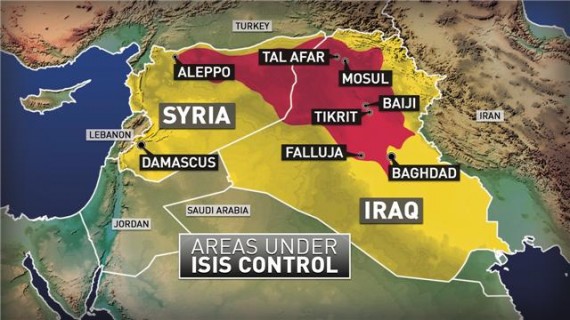

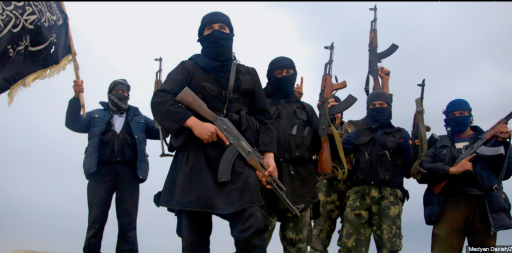

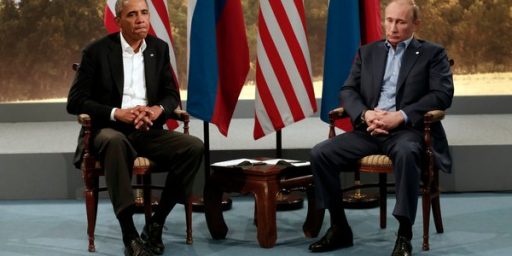
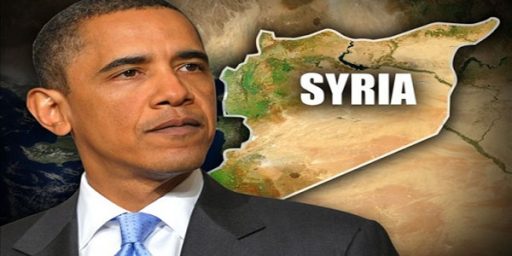
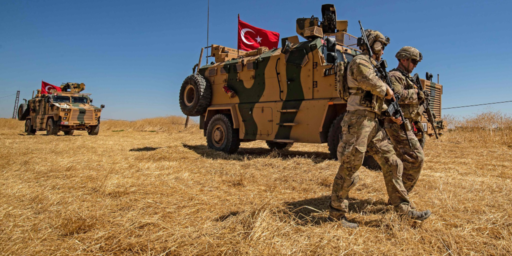
While I think your seeking grand narratives for ‘strategy’ is a bit precious, you are right as to this
A modicum of air support to the Kurds and as needed to the semblance of Iraqi national government, and abandoning the “moderate”(*) rebel fantasy in Syria is containment enough. No need for the West to go deeper.
(*: they did once exist, but that time has well passed)
I agree that we should not let this kind of atrocity push our buttons. And I have bad news for ISIS: the problem with gore and horror is that you keep having to top yourself to get the same reaction. It’s like heroin that way: you develop a tolerance requiring bigger doses.
We have the correct policy in place. We are using minimal force, just enough to keep the “good guys” from losing. If we big foot this we give the Arabs yet another opportunity for passivity and the inevitable kvetching from the sidelines. This has to be an essentially local fight. It has to Muslims stopping other Muslims. (Or in the case of Kobani, Communists stopping Muslims.)
By NOT going all Iraq 3 on this we are allowing the Kurds to grow stronger. We are giving Iraqis a chance to develop an actual, functioning military in response to a genuine threat. We are provoking Jordan and Saudi Arabia to get real about defense. One of the many,many flaws in the Bush approach was that we gave the local forces an excuse to sit on the bench – the high school team does not take the field if the NFL is already getting the job done.
This is extraordinarily complicated stuff with more moving parts than one can easily track, but given the general impossibility of that region, we are doing the smartest thing we can do.
The same thing worked wonderfully for OBL and got the cowards in the White House to panic and over-react…and over a decade later we are still paying the cost of their colossal blunder.
Today there is nothing the Neo-Cons would like better than to repeat the same mistake and compound the error.
Obamas measured response is the opposite of what would benefit ISIS, very popular with the moderates in the ME, pretty successful, and in the best interest of these Unuted Stares.
Wasn’t there a debate back this summer, when numerous Republicans yelled at the President to “do something” about ISIS? And haven’t a bunch more Republicans been elected, largely on fear mongering about “American weakness?”
Your problem, Doug, is that your preferred party, the Republicans , is even more gung ho about war with ISIS than the President, who would have probably liked to have the political space to stand pat and take a more low key approach.
In any case matters of strategy are really within the province of the President as commander in chief of the armed forces. During WW2, there were no debates about strategy, tactics, or the end game in Congress. Congress didn’t weigh in on “Europe First” , when to open a second front, whether to drop the atomic bomb, etc.
Congress can declare war: that is the extent of the Constitutional responsibilities. In this case, there is a question whether there is a war. Congress could weigh in on this , but doesn’t want to, because frankly, they’re OK with what the President is doing, and if anything, would rather he did more of it.
What’s interesting here is that the only way you would have gotten Congressional questioning of the ISIS campaign is with a result that Doug would most assuredly not have wanted: the Democrats winning majorities in Congress. THAT’S where the focus of antiwar sentiment in Congress is-not in the “Godsn’Guns” Party.
The chance of ISIS getting nuclear capability is highly unlikely, close to impossible. They have some jet fighters in their possession but evidently have not used them and most likely can not use them because of mechanical problems, upkeep, or lack of trained pilots.
While a huge ground force is not wise at this time, since this group of brigands, criminals, and lunatics poses no direct threat to the US, there should be some special force that gets in there and deals with the murderers responsible for these heinous, horrible crimes. This could be done without a large force, indeed a large force would not be practical, stealthy, or quick. It must be done or we will see more of these barbaric crimes. And the people have seen enough of that.
I noticed that General Dempsey has gone to Iraq. That is certainly good news and progress.
I believe it is casus belli rather than causus belli.
@stonetools:
Even alleged dove Rand Paul has rolled over to have his belly stroked by the neocons.
@michael reynolds:
I predict that by the time the Iowa caucus rolls around, he will be pro ISIS war, will look with a kind and understanding eye on NSA surveillance, and will be “open to a debate” on a personhood amendment. So it goes.
I agree with all of your post, except the “no coherent goals”. It’s clear that the goals are nuanced, but the citizens of our country doesn’t do nuance well.
Obama’s “degrade and destroy” is pretty clearly mostly just degrade. Hit ISIS hard enough and long enough that they have trouble solidifying their hold on areas, and trouble expanding. Don’t give them grand warrior deaths fighting the great satan, let them get blown up while moving supplies on highways.
If we put boots on the ground, and take care of ISIS once and for all, we will be in a position where we have to impose the new structure on the Middle East and then somehow maintain them — and that is never going to work. Also, we would probably march through Syria and kill off Assad while we were there, and the Russians would use that as an excuse to take over the rest of the Ukraine or something.
That is what the Republicans would push us towards (it’s all Obummer’s fault because he’s weak, so we’ll be strong!), and Obama is pushing back against that as much as he is pushing against ISIS.
If we went to war every time we had a casus belli, we’d be going to war a lot more frequently than we are and we go to war too unhesitatingly as it is. We’d’ve gone to war with the Chinese twice at least in the past 15 years.
The question is less whether there’s been an act of war than what’s in the national interest? I don’t think that what we’re doing now is in the national interest let alone an intensification of it.
Gosh, that Jazz show is brave. Look at him proudly demanding that the president put on his “big boy pants” and send an army consisting entirely of people who are not Jazz Shaw into battle. And then he can bravely fight against the tyrant who wants to raise taxes for the war that Jazz Shaw is demanding, will never fight in, and will refuse to pay for.
But he sounds really determined in his rhetoric, and to a right winger that’s all the sacrifice required. Other people can die for his bold moral stand.
@C. Clavin: But at some point, and soon, these murderers must be brought to justice and answer for their horrible crimes.
This ISIS has had plenty of time to stop all of this and surrender.
@Tyrell: I presume this is some sort of joke, mistaking foreign countries for the set of a poorly scripted American Western c. 1960
Can you imagine what a President Romney would be doing right now?
@lounsbury: This group needs to be brought down to size and that being immediately. People have had enough of this bunch. I agree that the Iraq army and other countries should be dealing with this, but until they are ready to step forward, the US needs to take all necessary action to teach this group a lesson; send in a team and round up the ones responsible. This could be done in a few weeks: It would not take a long term operation. This is no time to appear weak or indecisive.
@Tyrell: But what does “weak and indesicive” mean in practice in this case? It seems like W and I ends up equaling not escaliating the conflict. We shouldn’t put putting troops in just to look strong. Looks are for picking people up at bars not life and dealth/ internationl realtions. The issue is will putting troops in achieve our strategic goals, how likly is that to work and what is the next move after troops are on the ground. Whether it looks tough or weak isn’t relevant.
@Tyrell: You go get started. We’ll be right behind you.
Perhaps a stern letter is in order.
@Tyrell:
Hmm…where have I heard that before? It’s almost as if people choose not to learn from past mistakes.
You could say the same about hunger, racism, or poverty — with about as much chance of immediate success. What, exactly, does Jazz Shaw believe that our forces could do that would “put an end to this”? Hint: if he has something specific in mind, he’s wrong. If he doesn’t have something specific in mind, he’s worse than wrong.
@DrDaveT:
I agree. This is a very large geographic area. This isn’t a job a few special forces can knock out in a couple weeks. That’s why I think in the end it has to be a local thing. Locals with a really kick-ass air force.
@Dave Schuler:
So now is the time that you should lay out the better plan that is in our national interest. Let’s get you started.
1.
2.
3.
I said it during the Bush administration, and I’ll say it here to (*shudder*) support Obama: Unless you know the Classified information the real decision is being made on, you might as well be arguing over Lord of the Rings.
@John D’Geek: In the interest of bipartisanship, let me agree with you that the real decisions are not made on publicly available facts; we are, at best, receiving regurgitated analysis. There is a lot of information that our leaders have that we don’t have. And Gandalf may not be the weakly old man he appears…
Unfortunately, recent history proved that implied information is not a sufficient foundation for basing strategy. When the WMD were not found to the North, South, East or West of Baghdad, a lot of credibility, trust and flexibility were squandered. This accounts for much of the skepticism about the anti-ISIS campaign. The potential for a disastrous repeat is overshadowing the actual policy, which appears to be containing ISIS from expansion, maintaining a light presence in the area if needed and supporting a de facto balance of power between Sunnis and Shiites.
I’m skeptical of our new Iraqi/Syria adventure, and yet I haven’t seen any decisions that lead me to determine the campaign a boondoggle. But plenty of decisions have the potential to blow up into disaster. I hope our leaders are acting wisely. The fate of Middle Earth depends on it.
@jewelbomb: A small force could go in quickly and bring out one of their top leaders or the guy that has been on these videos committing these horrible murders. Put that on tv; that will take some wind out of their sails! I am not talking about a huge ground invasion. Covert, silent, quick. It has been done before.
“Do you feel lucky, punk?”
@Tyrell:
This is absolute fantasy. It has no bearing on the real world. It’s utterly absurd.
So, in fact you do mistake Hollywood action movie scripts for the real world. How very, very sad.